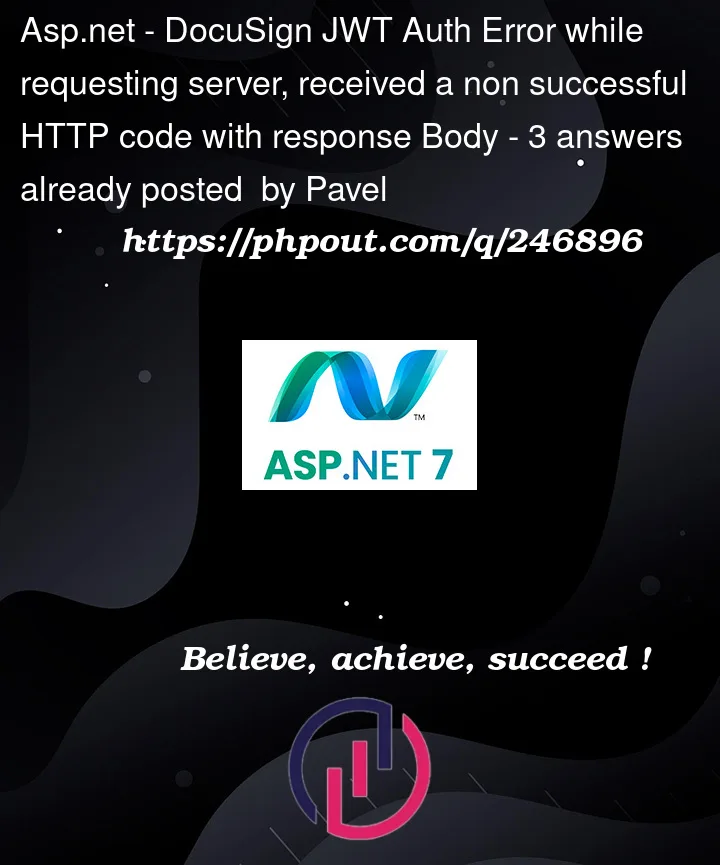I am trying to integrate DocuSign in my web application (.net framework 4.8). I’m using DocuSign eSign dll version 6.5.0.
I am trying to get an access token using JWT auth grant. I created an App and Integration Key in the DocuSign developer portal, and have granted consent.
However, when I attempt to get an Access token, it throws an ApiException with message:
Error while requesting server, received a non successful HTTP code with response Body:
getAuthInfo(out string clientID, out string rsaPrivateKey, out string impersonatedUserID);
var docuSignClient = new DocuSignClient();
var scopes = new List<string>{"signature","impersonation"};
var privateKeyBytes = Encoding.ASCII.GetBytes(rsaPrivateKey);
try
{
var authToken = docuSignClient.RequestJWTUserToken(
clientID,
impersonatedUserID,
"account-d.docusign.com",
privateKeyBytes,
1,
scopes);
return authToken;
}
catch (ApiException apiExp)
{
// Consent for impersonation must be obtained to use JWT Grant
if (apiExp.Message.Contains("consent_required"))
{
}
}
*** Update: ***
Installed eSign dll version 6.2.0 to match the same version as the Quick Start Console version which I confirmed works.
Also, changed the DocuSignClient instnatiation to pass a config with dev URL.
getAuthInfo(out string clientID, out string rsaPrivateKey, out string impersonatedUserID);
var config = new DocuSign.eSign.Client.Configuration("https://demo.docusign.net/restapi");
var docuSignClient = new DocuSignClient(config);
var scopes = new List<string>{"signature","impersonation"};
var privateKeyBytes = Encoding.ASCII.GetBytes(rsaPrivateKey);
try
{
var authToken = docuSignClient.RequestJWTUserToken(
clientID,
impersonatedUserID,
"account-d.docusign.com",
privateKeyBytes,
1,
scopes);
return authToken;
}
catch (ApiException apiExp)
{
// Exception Message: "Error while requesting server, received a non successful HTTP code with response Body: "
}
*** Update 2: ***
string directoryPath = Server.MapPath("~/App_Data/");
string fileName = "private.key";
var filePath = Path.Combine(directoryPath, fileName);
var privateKeyBytes = File.ReadAllBytes(filePath);
try
{
var accessToken = JWTAuth.AuthenticateWithJWT("ESignature", ConfigurationManager.AppSettings["ClientId"], ConfigurationManager.AppSettings["ImpersonatedUserID"],
ConfigurationManager.AppSettings["AuthServer"], privateKeyBytes);
}
catch (DocuSign.eSign.Client.ApiException apiExp)
{
// Exception: Error code 500
}




3
Answers
I figured out the issue. Not sure what version of TLS the eSign dll uses, but explicitly setting the SecurityProtocol to use Tls12 fixed my issue.
Save the RSA private key into a text file called private.key
Then do this :
Looking at the src code it appears that the sdk oauth server default is now production.
Fix is to explicitly create a "configuration" object with the demo oauth url for your DocuSignClient constructor